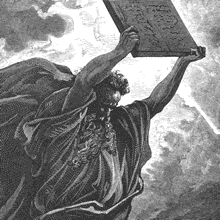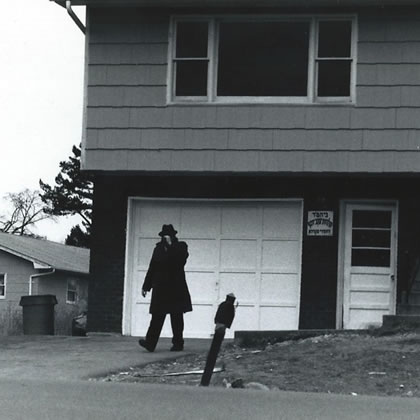..from the tales of Reb Nachman of Breslov.
Listen..
The Rabbi’s Son. This story was told in the Hebrew year 5557 (1807).
There was once a sage who did not have any children. Eventually, he was granted a son. He raised him and married him off.
The son would sit in an attic room and study, as was the custom of the wealthy. He would constantly study and pray. However, he sensed a lacking, although he did not know why. His study and prayer began to lose their inspiration. When he confided this to two of his friends, they advised that he visit a certain “Rebbe”.
This young man had done a particular good deed that had caused him to become an aspect of “the Lesser Light”. He told his father that he did not feel any inspiration in his religious devotion; that he had a sense of lacking and did not know what it was, and that he wanted to visit this particular “Tzaddik.”
“Why should you travel to him?” replied the father. “Aren’t you are a more accomplished scholar than he is, with a more distinguished lineage as well? It isn’t fitting that you go to him.” The father continued in this manner until his son became discouraged from going, and instead returned to his studies. Soon he again felt this void within. He sought advice from his two friends this time too, and again they advised him to visit the “tzaddik”. Again he went to his father, who sinned and dissuaded him yet again from the journey. This happened a number of times.
The young son continued to feel this lack, and had a great yearning to overcome it, but did not know how. He again urged his father and continued to press him until his father was forced to take the journey with him. He did not want his son to travel alone, for he was an only child.
“See!” said the father. “I’m even travelling with you! I will show you that there is nothing to this “tzaddik”. They prepared the carriage and set off.
“I will make a test,” declared the father. “If everything goes smoothly, then the trip is decreed from heaven. If not, then it is not from heaven, and we will return home.”
They continued onwards until they came to a small bridge. One of the horses slipped and the carriage turned over, causing them to nearly drown.
“Observe,” said the father. “Things are not going smoothly. This journey is not approved by heaven.” And so, they returned home.
The son returned to his learning. Again, he became aware of something missing in himself, though he could not determine exactly what. He again pleaded to his father, who felt obliged to attempt the trip with him a second time. As they travelled, the father asserted that a omen be made, as he had the first time. If the trip went without event, they would consider that the journey was indeed God’s will.
It happened though, as they rode, that both axles suddenly broke.
His father said, “Understand that we are being directed not to continue! Is it realistic for both axles to break? How many times have we ridden in this carriage, with nothing ever before happening like this?” So they again returned home. The son continued on in his previous ways, but soon after, again felt the same sense of dissatisfaction.
His friends again advised him to make the pilgrimage. He returned to his father and pleaded with him as before, so he had to go with him again. However, this time the son declared that the trip should not be determined by its events. It is understandable that a horse could occasionally fall, or even that the axles should break. They would continue on this time, unless a very, very auspicious omen occurred.
They travelled onward, eventually arriving upon an inn where they took rest. They encountered a certain merchant there who they began to converse with in the manner of businessmen. No mention was made of where they were travelling, since the rabbi was terribly ashamed that he was en route to visit to that particular “Rebbe”.
They continued their conversations of worldly affairs, and eventually the conversation began to drift to the subject of the pious and where they could be found. The merchant then began to describe several such tzaddikim and their whereabouts. The rabbi and his son then began to discuss the tzaddik to whom they were travelling.
“Him?! He is worthless,” said the merchant. “I am coming from him now. In fact, when I was in his presence, he even committed a sin.”
“My son,” responded the rabbi. “See what this merchant reveals to us in all innocence. And hasn’t he himself just come from there?”
They returned home, and the son died soon afterward. He then appeared to his father the rabbi, in a dream, seemingly in great anger.
He questioned him, “Why are you so angry?”
“Go to the rabbi that I wanted to visit,” replied the son, “and he will tell you why I am angry.”
He awoke suddenly, but eventually decided that the dream was irrelevant.” When he had the same dream again, he still said that it was meaningless. However, when it happened a third time, he realized that it must be significant, and so he set out for the “tzaddik”.
On the road, he happened upon the very merchant whom he had encountered while travelling with his son. He recognized him, and said, “Aren’t you the one I met in that inn?”
“It certainly was I that you saw there,” replied the other. Then he opened his mouth and said, “If you’re interested, I’ll swallow you!”
“What are you saying?”
The merchant replied, “Do you remember when you were travelling with your son? The first time the horse slipped on the bridge and this caused you to turn back? The second time the axles of your carriage broke and you turned back. The next time you chanced upon me; and I gave you my opinion that this particular “tzaddik” was worthless. Since I have now put your son aside, you may finally make the journey.”
“Your son was an aspect of “the Lesser Light”. The “tzaddik” was an aspect of “the Great Light”. If these two would have come together, Messiah would have arrived. But since I caused his parting, you can now make this journey.”
While yet speaking, the merchant apparently vanished. There was no one with whom the rabbi could now speak.
The rabbi now journeyed to the “tzaddik”, lamenting profusely, “Chaval! Oi Vaiy! Woe for those who are gone and can no longer be found!”
Only God will someday soon, return our wandering ones. Amain.
The merchant in this story was the Satan himself. He had appeared in the guise of a merchant, and was the cause of his poor judgment. Later on, when he happened upon the rabbi a second time, he ridiculed him for taking his advice, for this is his way, as is known. God be praised. He shall help us!

